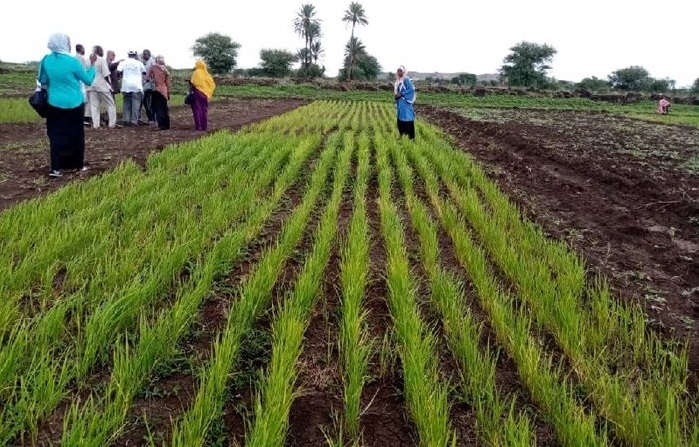Current Affairs
Upland Rice Production Continuously On The Rise In Sudan
05 September, 2021
KHARTOUM (Sudanow) - Production of upland rice has been seeing continuous rise since it was first introduced in Sudan in 2010, with assistance from the Japan International Cooperation Agency (JICA).
The upland rice production is a relatively new trend in the World when some of the major rice producing countries started to grow it instead of the traditional method in which the seedlings were sown in soil submerged with water.
In the upland rice, or Hawawe as it is called in Sudan, the seeds are just sown in the soil and then irrigated frequently like any other crop.
The move towards upland rice production is believed to have been prompted by the increasing scarcity of water in the World due to climatic change.
While rice is the major staple food for half of the World’s population, in Asia mostly, it is also the greatest growing source of food in Africa, according to the UN Food and Agriculture Organization (FAO). That is why its production should be boosted in order to achieve food security and reduce poverty in the Continent.
Japan contributes to the promotion of rice production in Sudan as rice has a potential to become an important strategic crop in terms of the domestic consumption and the export to the neighboring countries.
The growing of this type of rice covers ten of the states of Sudan, most importantly in the Gezira, the White Nile and Gedarif states. The experiment achieved a success that signals the possibility of applying it all over the country, according to JICA.
In the Gezira State (Central Sudan) the yield per acre has reached four tons in the experimental farm, while production per acre was 1.4 tons at the peasants’ farm levels, as compared to the targeted 1.6 ton an acre.
On Thursday a JICA delegation led by Mr. Usumo Nagasaki, the chief Japanese expert, and Engineer Alhaj Utwa, the national coordinator of upland rice, visited the Gezira upland rice seed fields. The internationally recognized and certified seeds are grown on an area of 30 acres in the Gezira. The visit was meant to assess the preparations underway for the current farming season and the future of upland rice in the Gezira State which, according to agronomists, is qualified to export rice.
Meanwhile, the White Nile state is known to grow submerged rice over an area of 20 thousand acres along the White Nile River banks. Its agricultural authorities say they endeavor to enlighten the farmers about the importance of growing upland rice due to its economic value and its contribution to food security.
The JICA delegation has also visited the White Nile State, presenting refrigerators to conserve rice sees. The delegation has also provided means of transport to the agricultural inspectors of the State.
For its part, the Agricultural Research Corporation has managed to produce new varieties of upland rice which were characterized with high and excellent productivity and quick ripening. The varieties have come under the names Kosti (1), Kosti (2), Umjar, and Akra.
The Corporation’s research program is taking arrangements with the private sector that cater for abiding by the technological packages and improved seeds. It is also seeking to encourage regional agricultural ministries to introduce rice cultivation in their respective regions as an export.
E N D
YH/AS
Post your comments
Photo of the Week
Everybody alive today came from one African country (The Independent) Ariana Baio Khartoum, Jan.1 (Sudanow)-It is well known that all humans alive today can be traced back to a common ancestor but a study may have found where that ancestor originates. Researchers at the University of Oxford’s Big Data Institute mapped the entirety of genetic relationships among humans t...
MoreNew media
The Poll
Archives
-
01 January, 2023
Phone battery killed nine persons, injured twelve
Zalingei, Jan.1 (Sudanow) - A dispute over a phone battery, in Marin Market, Central Darfur, led to the killing of nine persons and injuring of another twelve. The Director of Central Darfur Police, Salah Omar Al-Tayeb told SUNA last Thursday that main reasons behind the events in Zalingei began with a dispute over a phone battery, where one of the citizens stabbed to death. The police official added that the police forces moved to th...
Sudanow is the longest serving English speaking magazine in the Sudan. It is chartarized by its high quality professional journalism, focusing on political, social, economic, cultural and sport developments in the Sudan. Sudanow provides in depth analysis of these developments by academia, highly ...
MoreRecent tweets
Tweets by Suda_nowFOLLOW Us On Facebook
Contact Us

Address: Sudan News Agency (SUNA) Building, Jamhoria Street, Khartoum - Sudan
Mobile:+249 909220011 / +249 912307547







